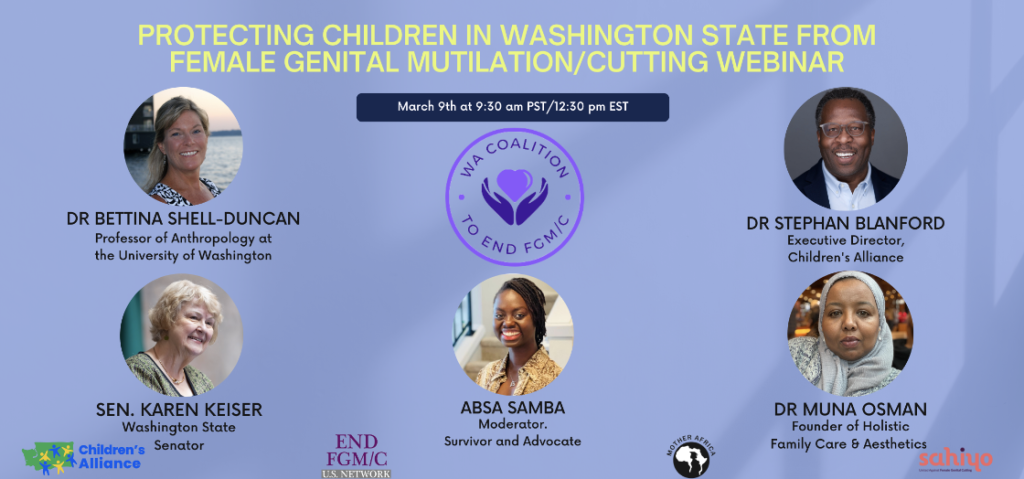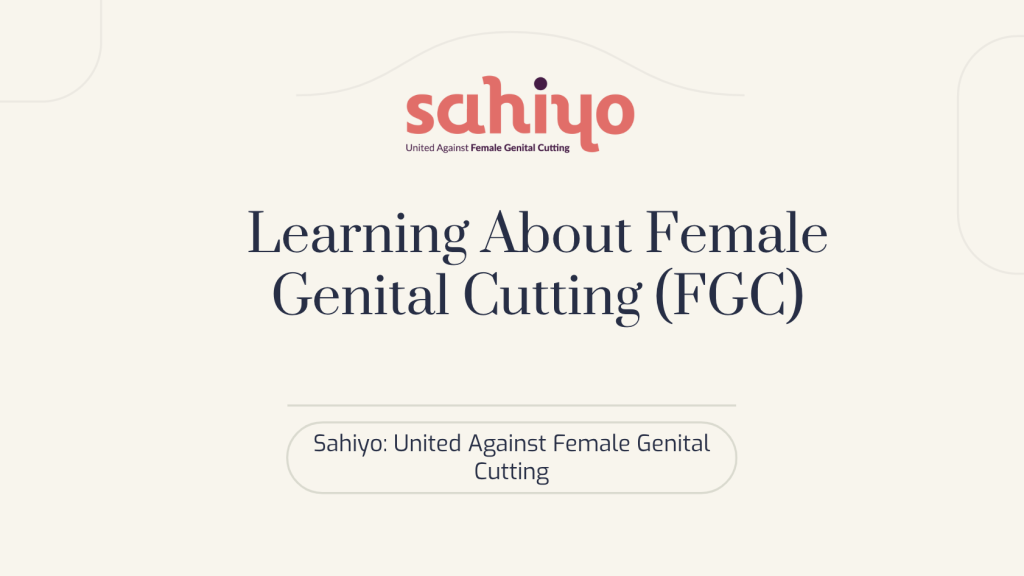Washington Senate Bill 5453 moves to House Appropriations Committee

In Washington state, Senate Billl 5453 concerning female genital mutilation/cutting (FGM/C) recently passed the House Committee unanimously, and is now scheduled for a public hearing with the House Appropriations Committee on Friday, March 31st at 1:30 PM PST. The bill, which was introduced on January 18th, aims to: create a private right of action for survivors of FGM/C; prohibit providers from performing FGM/C on a minor; establish education and outreach initiatives to prevent FGM/C; provide care for victims and families of FGM/C. You can show your support for this bill in one of the ways below: Testify In-Person (oral testimony limited to only 1-2 minutes max) Testify Remotely (oral testimony limited to only 1-2 minutes max) Submit Written Testimony Vote Pro Learn more about Washington SB 5453 from the Washington Coalition.
Washington Coalition hosts educational webinar on female genital cutting

On March 9th, the Washington Coalition to End FGM/C, in partnership with Sahiyo, The U.S. End FGM/C Network, Children’s Alliance, and Mother Africa, held a webinar called Protecting Children in Washington State from Female Genital Mutilation/Cutting with the goal of drawing attention to this human rights violation and how it impacts children in the State. The webinar was also held to highlight the need for Senate Bill 5453, which would make female genital cutting (FGC) illegal in the state, provide civil remedies for survivors, and call on education programs on FGC to be created. A 2016 study by the Population Reference Bureau estimated that 25,000 girls and women in Washington State are living with or at risk of undergoing FGC. The study also ranked the Seattle-Tacoma-Bellevue metro area as the 5th highest metro area in terms of size of the FGC-affected community in the U.S. The webinar hosted a panel discussion in which speakers Absa Samba and Muna Osman shared their personal experiences with FGC as survivors and activists working to end the practice. Researcher Bettina Shell-Duncan discussed how research supports the need for legislation to change social norms around communities believing that FGC had to continue for the good of the child. Finally, Stephan Blanford, Executive Director of the Children’s Alliance highlighted how the state has seen other sharmful ocial norms regarding children change through policy in the state and how he is confident the same could be said if a law on FGC were created. Watch the recording of the webinar here: [youtube url=”https://www.youtube.com/watch?v=pZEefGBUTzQ”]
Washington SB 5453 moves to the House

SB5453 in Washington State is onto a hearing in the State’s House for Monday, March 13th after passing the Senate unanimously. To express your support of SB5453: You can vote PRO by clicking this link. This is the quickest and easiest way to express your support of this bill! For WA based members, click here to testify In-person If you would like to testify virtually, please schedule your testimony here Lastly, you can submit written testimony Statement from the Washington Coalition: We are a newly formed Coalition working to end the practice of female genital mutilation/cutting (FGM/C) in the State of Washington. We comprise a broad group of survivors, stakeholders and advocates. Forty US States have laws banning the practice of FGM/C. Washington has yet to address this important human rights issue in any manner. This proposed legislation SB 5453 under review today is a good first step towards ending the practice and supporting survivors in Washington State. Review the Washington Coalition’s factsheet to learn more about this bill and its significance.
Calling for a Global Summit to end FGM/C

On March 7th, the Global Platform for Action to End FGM/C issued a joint letter calling for a Global Summit to end female genital cutting/mutilation (FGM/C). The Global Platform, a consortium of civil society organizations, champions, survivors, and grassroots representatives united to support the abandonment and prevention of FGM/C, also called attention to the funding gap (or lack of adequate funding) of over $2 billion. The letter suggests ‘convening a Global Summit aimed at sincere commitments and increased sustainable funding.’ Learn more about this advocacy call.
A conversation with Washington activist Absa Samba: SB 5453 a product of collaboration and persistence

By Rachel Wine As the Washington Senate Bill 5453 concerning female genital mutilation/cutting (FGM/C) moves forward in the legislature, I had the honor of speaking with Absa Samba, who has been instrumental in advocating for legislation on FGM/C in Washington state. Absa’s advocacy journey began over a decade ago, when Absa was in middle school. She attended a training, which explored gender issues, and it immediately became clear that things like gender expectations, gender roles, and harmful cultural practices were connected. “I think the training… became a validation for what I’ve always felt, this inequality that existed in my society, and… I had language for what was going on, and that’s when I started getting involved in advocacy and activism for the rights of women. A big part of that became advocating against harmful cultural practices, like child marriages and female genital cutting.” Washington, where she currently lives, is one of ten remaining states without a law against FGM/C, though it is one of the highest-risk states; a 2016 study found that the Seattle-Tacoma-Bellevue metro area was the 5th highest metro area in the U.S. in terms of the size of the FGM/C-affected community. Absa’s background as an activist, and personal connection to this issue and other harmful cultural practices (she is a survivor of FGM/C), inspired her to choose FGM/C as her focus for a policy analysis class assignment. “I was just doing an assignment, and I found out through my research that there were two bills that were presented that never made it out of Committee. And I think when I noted that in my paper, my professor asked me to find out why those bills failed, and that’s when I reached out to one of the Senator’s office who had sponsored the bill in the Senate.” What began as a class assignment evolved into an opportunity for Absa to chat Senator Karen Keiser on FGM/C in May of 2022. “The Senator herself met with me and wanted to chat about the bill, the issue. And out of that conversation, I was like, okay, maybe a presentation on what FGM is would be helpful for this person, they seem really interested in it. So I opted to do a presentation, and the Senator was gracious enough to take the offer and invited other chairs of different Committees in the Senate to come to that, and it was at that point that I realized I was taking on more than I could afford to at the time. So I was connected with Mariya [Taher] and I reached out to Bettina [Shell-Duncan] and other folks and I said, “Hey, this is an opportunity to talk to these people about FGM in Washington, would you be interested in joining?” And they were kind enough to come on and help me with that presentation, and I think it was that moment that we realized, actually, this is really an opportunity to do something about this issue in Washington State.” By pulling together support from the FGM/C sphere, Absa unknowingly planted the seed for the group that would become a key stakeholder in SB 5453’s creation. Senator Keiser recognized the opportunity to do something from this initial experience; “her desire to introduce a bill on FGM/C solidified this work.” Absa began to facilitate the group working with Senator Kaiser, who was determined to loop in advocates and survivors in creating the bill. Absa would organize meetings and generate statements for the group, which eventually became the Washington Coalition Against FGM/C. The Coalition and various other stakeholders worked closely to co-author the bill, and Absa is rightfully proud of that. “We’ve worked with the Senator closely to create the bill, I think what was remarkable was how much time Senator Keiser invested in making sure the bill was the way it should be, that it speaks to the realities of communities that are affected by the issue. That it was done in collaboration with stakeholders in this issue, we [the Washington Coalition] have worked with her in the process of creating a bill to give feedback and input on what we think should be in the bill, and what shouldn’t. And working to find a common ground, so that we could work collectively. I think that can be seen in how well the bill was done and how well it’s progressing in the legislature at this time.” As SB 5453 moves to the House after passing in the Senate on March 1st, the Coalition continues to lead the drive for change. Though Absa’s goal was never to form this Coalition or even do this legislative advocacy, she has found herself here by believing in this work. The support of her fellow Coalition members, many of whom are also survivors that care deeply about this work, has also been critical; Absa has learned that “little steps and persistence will inspire others to power it along.” When considering their success, she emphasizes the importance of varied backgrounds and expertise that Coalition members bring to the table, which got things going in the right direction. “Building a team and getting various stakeholders involved in making change happen is significant. Collective voice has the power.” When asked for any advice she may have for other advocates, or anyone hoping to take a stand for something important to them, Absa had this to say: “Do something. Not doing anything is not an option. The little wins matter, and what makes the goal achievable is not entirely dependent on one individual, it takes a collective. The more you keep going, the more people buy into your goal, the closer you get to achieving the goal.” In the case of Washington, this certainly rings true. Absa Samba is a graduate student pursuing a double masters in Social Work and Public Administration at the University of Washington’s Evans School of Public Policy and Governance and the School of Social Work. She is a survivor of FGC and a passionate advocate for
My thoughts on the Washington Senate Bill to end FGM/C

By FA When I was a teenager, my family discouraged me from speaking out against khatna, or female genital mutilation/cutting (FGM/C), for fear of repercussions from our community. I wanted to use my voice, but I did not want to disappoint my parents or bring shame to my family. As I followed the Detroit FGM case in 2018, I became increasingly disappointed as it all unraveled. Then I learned about Sahiyo and the amazing work they were doing to end FGM/C; I decided to use my voice to advocate for what I believe to be right. As a part of my advocacy, I am volunteering with the Washington Coalition to End FGM/C. While forty states already have anti FGM/C laws, Washington State does not currently have such a law. A 2016 study ranked the Seattle-Tacoma-Bellevue metro area as the fifth largest metro area in the U.S. in terms of the size of the FGM/C-affected community, which makes this lack of legislation especially concerning. State laws are critical in our journey to end this practice for a variety of reasons. For example, WA Senate Bill 5453, a bill heard on January 30th by the Senate Committee on Law & Justice , will create a private right of action for victims of FGM/C which will allow survivors to stand up for themselves in court when they are ready to do so. It prohibits providers from performing FGM/C on a minors, which helps curtail vacation cutting practices (sending the girl away on a “vacation” abroad with family for her to be cut). It establishes education and outreach initiatives to help teach families about the harms of FGM/C. Moreover, it provides care for victims by strengthening the mandatory reporting requirements to include FGM/C. By adding FGM/C to the mandatory reporting list, it will be legally required for certain fields to report the harm to the authorities (ie. child abuse reporting laws). These civil remedies give victims some of their power back, but it is not enough to deter others from committing this act in the future. In order to discourage community cutters from performing this act, there needs to be a strong deterrent in place. Based on my experiences, there is an enormous amount of cultural pressure to perform FGM/C. The penalties must be heavy enough to deter the cutter, and from what I have seen, monetary fees are not enough. For me, it is important that this bill includes an element of criminalization for those who perform the cutting, in addition to civil remedies. One of the aspects that I love about Sahiyo is the multi-faceted approach taken to end FGM/C. I am proud that the proposed bill reflects this approach and hope that you are able to support its passage.
Washington Senate Bill 5453 concerning female genital mutilation/cutting moves forward in the Senate

On Tuesday, February 14th at 4:00 pm PST, SB 5453 concerning female genital mutilation/cutting (FGM/C) in Washington will move to the Senate Ways and Means Committee and for a Public Hearing. Here is how to get involved: Submit written testimony Testify virtually To vote pro Testify in-person Statement from the Washington Coalition: We are a newly formed Coalition working to end the practice of FGM/C in the State of Washington. We comprise a broad group of survivors, stakeholders and advocates. Forty US States have laws banning the practice of FGM/C. Washington has yet to address this important human rights issue in any manner. This proposed legislation SB 5453 under review today is a good first step towards ending the practice and supporting survivors in Washington State. Review the Washington Coalition’s factsheet to learn more about this bill and its significance.
The hearing for Washington Senate Bill 5453 concerning female genital mutilation/cutting

On Monday, January 30th at 10:30am PST, SB 5453 concerning female genital mutilation/cutting (FGM/C) will be called for a hearing by the Washington state Law and Justice Committee. The bill, which was only introduced on January 18th, aims to: create a private right of action for survivors of FGM/C; prohibit providers from performing FGM/C on a minor; establish education and outreach initiatives to prevent FGM/C; provide care for victims and families of FGM/C. If you live in Washington or have expertise on FGM/C, here are ways to voice support for the passage of legislation: Provide oral testimony during the hearing either in-person or virtually by signing up here. Submit written testimony with this link. Please note that written testimony is due within 24 hours after the hearing. Vote in support of the bill without providing any oral or written testimony here. Sign this Change.org petition created by Abid and Maryum Saifee (this can be done in combination with any of the other options). For more information, take a look at the Washington Coalition’s factsheet to learn more about this bill and its significance. Statement from the Washington Coalition: We are a newly formed Coalition working to end the practice of female genital mutilation/cutting (FGM/C) in the State of Washington. We comprise a broad group of survivors, stakeholders and advocates. Forty US States have laws banning the practice of FGM/C. Washington has yet to address this important human rights issue in any manner. This proposed legislation SB 5453 under review today is a good first step towards ending the practice and supporting survivors in Washington State. Review the Washington Coalition’s factsheet to learn more about this bill and its significance. Additionally, in case you missed the hearing, click here to watch!
Reflecting on an Israeli Minister’s decision to not grant asylum for a woman fleeing female genital mutilation/cutting

By Rachel Wine On November 17th, outgoing Israeli Interior Minister Ayelet Shaked forwent the unanimous recommendation from a committee on refugee policy and rejected the asylum request of a young Sierra Leonian woman fleeing female genital mutilation/cutting (FGM/C). The Minister cited several reasons for her decision, many of which included problematic assumptions about FGM/C. I’ll aim to unpack these and provide points of consideration regarding power, politics, and FGM/C. FGM/C is not a “developing countries” issue. In reference to the Geneva Convention relating to the Status of Refugees, Shaked insisted that it was “not designed to address all of the difficulties and hardships suffered by hundreds of millions of people in developing countries.” This false belief that FGM/C only occurs in developing countries can be used to other those affected by the practice and absolve responsibility for taking action. In reality, FGM/C occurs in 92 countries, including the United States. Were this asylum-seeker from Canada or the United States, would Shaked’s decision to deny refugee status stuck? What constitutes a trauma that is “sufficient” enough? And who has the power to declare it as such? There is a discriminatory tone to Shaked’s point about the Geneva Convention too, as she insists “a threshold of some kind… as sufficient grounds for persecution” is necessary for considering refugee status. The WHO has declared FGM/C a human rights abuse, and therefore I do not believe anyone has the right to question the validity of this fleeing woman’s struggle, much less someone with power and influence like Shaked. Considering the Minister’s involvement in Israel’s nationalist politics, it is possible that her decision is part of a larger agenda to keep certain racial groups out of the country, which should disqualify her from making decisions regarding refugees and asylum seekers. FGM/C is not a cultural practice and cannot be compared with male circumcision. To further reinforce her decision, Shaked falsely conflates FGM/C with cultural identity by claiming that “some [forms of FGM/C] are similar or milder than ceremonial male circumcision.” To assign cultural significance to FGM/C also serves as justification for the practice in the name of preserving tradition, much like Shaked is trying to do with male circumcision in Jewish populations. Furthermore, the assumption that FGM/C is a cultural or religious practice denies the reality that FGM/C is globally pervasive, and cannot be lineated with or justified by any one identity, be it religion, culture, or ethnicity. While both culture and religion are large reasons that FGM/C continues, and institutions that uphold the social norm of FGM/C, this harmful practice must be seen as gender-based violence, a suppression of feminine sexuality and freedom, as an attempt to intimidate and control. To deny this truth is to enable the continuation of this violence, and we cannot let culture or religion continue to be an excuse for this human rights violation. No one form of FGM/C is more harmful, and all iterations of the practice are damaging to survivors. Finally, Shaked undermines the trauma inflicted by millions of survivors by claiming: “only a portion of [the forms of FGM/C] have the potential to inflict sufficient serious harm that could be considered persecution.” This statement invalidates the lived reality of every survivor, and reveals Shaked’s lack of knowledge on the practice. This again raises the question of who can be granted authority to make such decisions, and speaks to the need of organizations like Sahiyo, who work tirelessly to educate and dispel falsities that are harmful and dangerous. A note from the author: I often question what my role as an activist should look like. As a white Jewish woman, I know it is not enough to remember the oppression of my own ancestors; as Fannie Lou Hamer said, “nobody’s free unless everybody’s free.” I believe the critical work of activism for a person of privilege such as myself must encompass standing with and supporting those who face oppression in all of its iterations and holding members of your community accountable for problematic and dangerous behavior. When other Jews fail to use their privileges in standing against oppression, and particularly the oppression of non-Jews, I must reckon with the impact of these choices. To be the descendent of an oppressed people, and yet still play a role in the oppression of others, is a disgrace to our ancestors and their legacy of survival; this survival is only made possible through communal care, as well as solidarity with other marginalized groups. I encourage everyone to consider the impact of your choices and the choices of your peers. Hold yourself, and others, accountable. We must use the power we have to protect each other to the best of our ability. Finally, I believe anyone of the Jewish faith who supports Shaked’s decision should turn to this teaching from the Torah: “The strangers who reside with you shall be to you as your citizens; you shall love each one as yourself, for you were strangers in the land of Egypt” (Leviticus 19:36).
Sahiyo presents at the Mitchell Hamline School of Law in Minnesota

On November 2nd, Sahiyo Programs Coordinator Catherine Cox and current volunteer (as well as former Development Assistant) Sarrah Hussein partnered on a presentation for a class at the Mitchell Hamline School of Law in Minnesota on the topic of female genital mutilation/cutting (FGM/C). The presentation included some background on what FGM/C is, it’s prevalence in the U.S., and some legal background in the United States. More specifically, they introduced some of Sahiyo’s past legal work in Massachusetts, and current work to get a comprehensive state-wide law passed in Connecticut . To learn more about Sahiyo’s community education and outreach programs, visit this page on our website.
